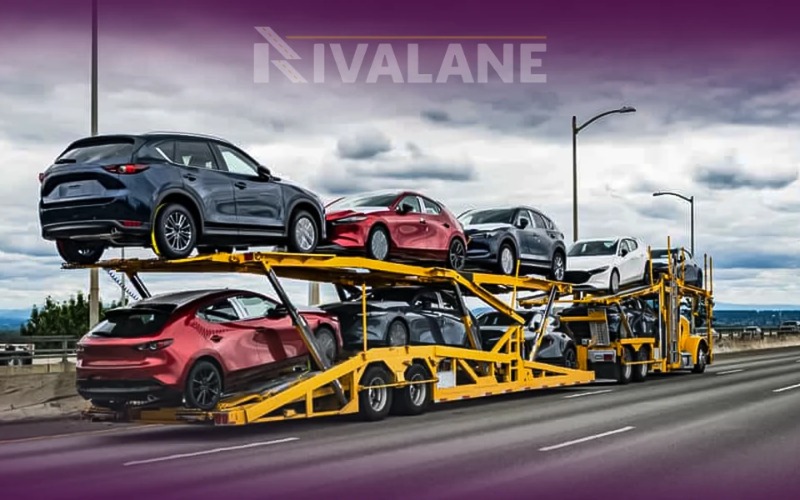The automotive logistics sector is currently experiencing a technological revolution, with artificial intelligence (AI) leading the charge. AI is fundamentally altering how vehicles are transported, allowing companies to enhance efficiency, lower costs and improve customer experiences. Although the impact of AI reaches every aspect of vehicle shipping, it is particularly evident in optimizing routes and implementing predictive maintenance.
There are transformative applications of AI within automotive logistics, with future trends that are set to revolutionize the industry. However, the challenges that accompany these advancements cannot be overlooked, because they will shape the trajectory of logistics in the years to come.
At the forefront of this evolution is Rivalane, a trusted name in vehicle shipping. With cutting-edge tools, transparency, and innovative solutions, Rivalane is committed to making auto shipping seamless, efficient, and customer-focused.
How AI is Currently Shaping Vehicle Shipping
1. Route Optimization
One of AI’s most impactful contributions to vehicle shipping is route optimization. AI systems analyze real-time data such as traffic conditions, weather forecasts, road closures, and fuel prices to determine the most efficient routes for vehicle transport. This ensures faster delivery times and minimizes fuel consumption, leading to both cost savings and a reduced environmental footprint. For instance, carriers that adopt AI-enabled logistics tools can significantly cut down on delays and unnecessary mileage.
2. Intelligent Load Matching
AI-powered load-matching platforms are transforming how carriers fill their trucks efficiently. These systems analyze vehicle capacity, shipment sizes, and destinations to pair shipments with the most suitable carriers. By automating this process, companies can reduce downtime, improve fleet utilization, and enhance profitability. In a sector where every mile matters, intelligent load-matching ensures no resources are wasted.
3. Predictive Maintenance
Downtime due to unexpected vehicle breakdowns can cause substantial delays and financial losses. AI addresses this challenge with predictive maintenance technology. Sensors installed on transport trucks collect data on engine health, tire pressure, and brake performance. AI algorithms process this information to predict potential issues, allowing carriers to perform maintenance before problems arise. This proactive approach enhances safety, reduces repair costs, and ensures smoother operations.
4. Customer Support Automation
AI isn’t just optimizing the logistics side of vehicle shipping; it’s also improving the customer experience. Chatbots and virtual assistants powered by AI provide instant support, answering customer queries, tracking shipments, and even assisting with booking. These tools allow customers to receive updates 24/7, streamlining the shipping process and enhancing satisfaction.
Future Trends in AI-Driven Vehicle Shipping
As AI technology evolves, its impact on the automotive logistics industry will deepen. Here’s a look at some emerging trends:
1. Autonomous Transport Vehicles
The integration of AI with autonomous driving technology is revolutionizing long-haul vehicle shipping. Self-driving trucks, equipped with AI systems, can operate continuously without human intervention. This reduces driver fatigue, enhances road safety, and boosts operational efficiency. Autonomous transport vehicles also have the potential to lower shipping costs over time, making car transport more accessible.
2. Advanced Supply Chain Visibility
Transparency in the supply chain is becoming increasingly critical for logistics companies and their customers. AI enables real-time tracking of vehicles during transit, providing detailed insights into location, estimated arrival times, and any potential delays. This level of visibility not only improves planning and coordination but also builds trust between companies and their clients.
3. Enhanced Data Analytics for Strategic Decisions
AI systems process vast amounts of historical shipping data to uncover patterns and trends. Companies can leverage these insights to optimize fleet management, forecast demand, and adjust pricing strategies. For example, understanding seasonal demand fluctuations can help companies allocate resources more effectively, ensuring better customer service during peak periods.
4. Sustainability in Logistics
As environmental concerns grow, the logistics industry is under increasing pressure to adopt sustainable practices. AI plays a pivotal role in this transition. By optimizing routes, reducing idle times, and managing energy consumption in electric transport vehicles, AI helps companies reduce their carbon footprint. This aligns with global efforts to create greener supply chains and meet regulatory standards for emissions.
Challenges and Considerations in AI Adoption
While the benefits of AI in vehicle shipping are significant, its implementation comes with challenges. For starters, the upfront investment in AI infrastructure can be substantial, particularly for small and mid-sized companies. Training employees to use AI systems effectively also requires time and resources.
Additionally, regulatory frameworks need to evolve to address the unique aspects of AI-driven logistics. Issues such as data privacy, cybersecurity, and liability in the case of autonomous vehicle accidents must be carefully considered.
Why AI-Driven Vehicle Shipping Matters
The adoption of AI in vehicle shipping isn’t just about staying ahead of the curve; it’s about meeting the evolving needs of businesses and consumers. Customers increasingly expect faster delivery times, greater transparency, and more sustainable practices. AI allows logistics companies to meet these demands while maintaining profitability.
AI also enables companies to adapt to unforeseen circumstances, such as sudden changes in demand or disruptions caused by natural disasters. By analyzing real-time data and making informed decisions, logistics providers can maintain service quality even in challenging conditions.
As a forward-thinking leader in the vehicle shipping industry, Rivalane integrates AI into its logistics operations to provide exceptional service, reliability, and cost efficiency.
Conclusion
Artificial intelligence is poised to transform the vehicle shipping industry, offering solutions to long-standing challenges while unlocking new opportunities for growth. From optimizing routes and reducing costs to enhancing customer satisfaction, the benefits of AI are undeniable. Companies that embrace AI-driven solutions will not only gain a competitive edge but also set new standards for efficiency and sustainability in automotive logistics.
As technology continues to evolve, the possibilities for AI in vehicle shipping are limitless. Whether it’s autonomous transport vehicles or advanced predictive analytics, the future of automotive logistics is bright—and it’s powered by AI.
By integrating cutting-edge AI tools and systems, the vehicle shipping industry is paving the way for a more efficient, transparent, and sustainable future. For businesses and customers alike, this revolution in logistics promises to deliver unparalleled value.











